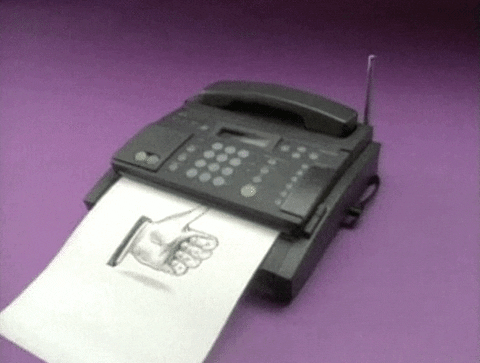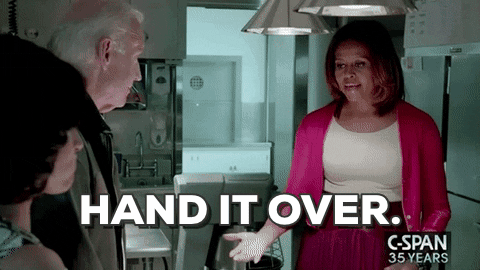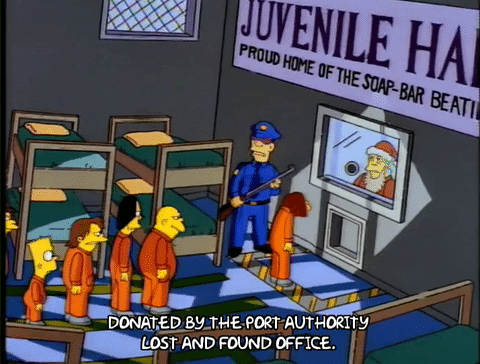I'm gonna be real, the only things I know about being a lawyer are from watching Better Call Saul. And Always Sunny, but specifically for learning about bird law. But if there's anything I do know about the courtroom, it's that the weirdest laws can be pulled out of thin air to drastically change a case's verdict.
Lawyer up, my dudes. Here are some of the strangest courtroom stories. Thejoms asked:
Lawyers/Solictors, what is the strangest or oddest law that's won a case for you?
We’re about to learn about some very niche laws. Buckle up.
That’s one way to not go bankrupt.
“I had a client with a serious medical problem that cost her her job, and she was preparing to file bankruptcy on the medical bills and credit card debts.
Thing was, she had like $15,000 socked away and didn't tell me. It was all that was left of her life savings. Before we filed her case she gave it to her mom for safe keeping. What she didn't know is that she could have kept the money through the bankruptcy… but giving it away beforehand is a no-no.
I had to tell the court when I found out, and when this happens the court gets the right to sue the mom for the $15,000. The thing is, the mom's debt to her daughter's bankruptcy court? Also dischargeable in bankruptcy. So the mom filed bankruptcy too, and they got to keep the money after all.”
Nice work.
 episode 5 book GIFGiphy
episode 5 book GIFGiphy“I got a pro bono client's removal by USCIS cancelled. He had a low-level drug possession conviction from the early 1980s. During that brief period, the active ingredient of Imodium was illegal under state law but not federal law. So I successfully argued that they couldn't prove it wasn't a conviction for possession of a substance that was federally legal at the time, and as such was not subject to removal. The argument worked and my guy went back to his business and his family."
This is the best story I’ve ever read.
“The weirdest case I have ever dealt with was *Joly v Palletier, * [1999] O.J. No. 1728 (S.C.J).
I did some research for this case when I was a law student.
Some background: this was at a time when the Ontario Court of Appeal had held that, if there were any factual matters in dispute, a case could not be dismissed on summary judgment. That is not the case today - it was discovered that this position basically ruined summary judgment as a useful process - but it was at the time. In such a motion, all facts alleged by he plaintiff would be assumed to be true …
What happened was this: a man sued, among others, the College of Dental Surgeons - for "persecuting him" and interfering in his ability to live as a "generic Martian". The plaintiff claimed he had been cloned from space debris NASA found in the 1960s. He claimed he had a genetic test to prove this, but it had been falsified by the CIA as part of the conspiracy against him.
Well, naturally, this claim raises the concern that the plaintiff was bonkers, but there was no evidence (aside from his bizarre claims) of that.
In court, the case was decided on two alternate grounds - first on the boring grounds that the case was patently frivolous and vexatious because it was absurd.
However, it was also decided on the more entertaining basis of standing. Justice Epstein held that only a "person" could commence an action in Ontario. The Rules of Civil Procedure define a "person" to be either a human being, or a corporation. The plaintiff's whole case was based on him being a Martian. If he was not a Martian, his case had no merit. If he was a Martian, he lacked standing to commence a lawsuit in Ontario!
In short, we now have precedent that Martians cannot sue in Ontario.”
Now THAT’S a loophole.
“I had a case where a guy was charged for running a red light. The thing is, he had been sitting at the lights for 5 minutes and it hadn't changed. The wording of the specific section under which he was charged related to stop signs and traffic lights and referred to them as ‘traffic regulation devices’. I successfully argued that as the traffic light wasn't changing, it wasn't regulating traffic and he got off. I couldn't believe it when the judge ruled in my favour, neither could the police prosecutor!”
These lawyers really took the phrase “lawyer up” seriously. They know their sh*t.
But why would you fax that to a law firm?
 90s thumbs up GIFGiphy
90s thumbs up GIFGiphy“47 U.S.C. 227(b) (restrictions on use of automated telephone equipment)
Law student working at law-firm. We have a fax machine that gets tons of spam faxes.
Our chief partner has a vendetta against spam, and he uses it to give us practice in researching and writing petitions. So we catalog each fax, send replies to take us off the list, document everything and wait for them to fax us again. Then we follow up with a FCC complaint and demand letter. A couple times this has ended up with the person getting mad and sending us retaliatory faxes (black sheets of paper).
If they stop sending we don't do anything, but we've gone to small claims a couple time, and gotten $500 per page a couple times.
We also got someone trying to sell drugs thru fax but we just turned that over to the police.”
People Share The Scariest Thing They've Ever Experienced While Home Alone | George Takei’s Oh Myyy
This is a weird one.
“There was a case here in Hawaii that got thrown out like this. Someone got pulled over because the police saw she had way too many passengers in the car. Then they noticed she was drunk. Open and shut case. Well, apparently in Hawaii, there's no law defining the maximum number of passengers in a private vehicle, so the issue was that all the extra passengers weren't wearing seatbelts. Well, this failed also, because the law only says that every available seatbelt needs to be in use. If you have six passengers and only five seatbelts, there's nothing at all illegal about the sixth being unrestrained.
So, since there was no probable cause to pull her over in the first place, even though she was indefensibly drunk, the whole thing got thrown out. Hawaii has some very counterintuitive laws. If your truck has seats installed in the bed, your passengers must be buckled up. If not, they can just party back there, while anyone in the cab unbuckled would get you a major ticket. People regularly ride down the freeway in truck beds while sitting in lawn chairs.”
This lawyer understood the assignment.
“I won a case where the defendant (New York City) tried to exploit a really stupid law, which I was able to use to win the case. This was a slip and fall case where my client had tripped on a piece of broken sidewalk outside of the Natural History Museum and shattered her arm and wrist. The law is that a property owner is responsible for the sidewalk directly outside of their property, the theory being even if they can't fix it, the have a duty to warn people about hazards and mark the area off.
The museum was owned by the city. There's another concept called sovereign immunity, which is that governments can't be sued without their consent. So the city had passed a very, very stupid law that they would be exempted from the rule that they can't be sued for sidewalk injuries unless you can show they were on notice of hazard. Meaning, you would have to show that you informed the Secretary of State/Governor/Mayor etc. of the exact specific crack in the sidewalk before the injury occurs, and you had to do so in writing with ample time for the city to remedy it (180 days in advance IIRC). Under normal circumstances, this is impossible because no one anticipates tripping on the sidewalk 180 days in advance with the foresight to write a letter to the mayor about that specific crack.
Luckily, someone did have that foresight, and there was a non-profit called Big Apple Maps which would go around the city and with maps of government property and record with insane specificity each and every crack in the side walk, pothole, protrusion, and other hazard, and then publish these maps while serving copies on the government, with the express purpose of combatting sovereign immunity defenses in slip and fall cases against the government. I got ahold of one of these maps and visited the site, and I was able to take pictures of the section of the sidewalk where my client fell, and you could see newly placed concrete over the area in the exact position indicated on the map, showing where the sidewalk had been repaired after my client slipped.
Basically, the government's attorney brought up the sovereign immunity defense and outlined all of the stupid steps I would have needed to go through to overcome their motion to dismiss. My response was "oh you mean this?" and gave them the map.
Immediate settlement.”
The long arm of the law apparently extends very, very far, to some very weird places.
Get that big check.
 hand it over GIF by ObamaGiphy
hand it over GIF by ObamaGiphy“Early in my career I had a fairly minor case in which my client's neighbor cut down a bunch of shrubs and small trees bordering their properties because they blocked his view. This really irritated my client as he wanted his privacy.
Now, the monetary damages were actually not that much and this was looking like a case that really couldn't be economically litigated for what the client could afford. However, in researching the issue I found a rather obscure law that provides for attorneys' fees to a winning Plaintiff when a Defendant has willfully damaged the "border" foliage of a "ranch" or "farm." In looking up the definition of these terms I realized that my client's property actually qualified for the statute as he used his land for growing a variety of produce for market.
Once attorneys' fees were on the table the other side quickly caved and wrote a big check to cover the damages.”
A lucky turn of events.
“Over 10 years ago, I had been at fault for rearending someone else. I had no insurance and my license had expired. I don't think I need to mention that I was in a very destitute, low place in life, struggling with almost every conceivable aspect of living.
The cop was very kind as we talked, but wrote me a ticket for it all. One was kind of a fix-it ticket about my suspended license. I sorted that out in the days after and nothing came of that ticket. The cop had mentioned that he HAD to write the insurance ticket, but to take it into court and get it lowered.
I was desperate to try and get my $800 insurance ticket lowered because I couldn't afford something like that. So I took the cop's advice.
I went in to traffic court weeks later and when it was my time to chat with the judge in front of everyone there, the judge looked at the ticket, stopped me and said, "I would like to use Mr. Southseattle's case as an example to the gallery." I almost died. He went on, "this is a court of law, but it is also a court of fairness. It seems as if the officer didn't write the date of the incident in the ticket. I can't hold Mr. Southseattle accountable to this."
My jaw dropped. I stood there. The judge told me I was free to go twice before it registered.
I'm pretty sure that cop deliberately didn't write the date on that ticket. Thanks, officer.”
Another lucky one.
“In 2016, prison inmate John Modie was charged with escaping from the prison in which he was incarcerated, which is a crime in Ohio. The prosecution, however, failed to establish that the Hocking Correctional Facility (and therefore the crime) was located within the court's jurisdiction of Hocking County, as all witnesses potentially able to offer testimony on the prison's location had gone home for the day, and, incredibly, no one remaining could provide references allowing the court to take judicial notice of the prison's location. The charges against Modie were dismissed, and he was allowed to... return to prison to serve his sentence (but at least without additional charges concerning his alleged escape).”
These next few clients truly got lucky with the lawyers they chose.
Oops.
 GIF by Paramount MoviesGiphy
GIF by Paramount MoviesGiphy“Not my story but one of my teacher's stories. He was taking attendance and someone was absent, but the other students told him that the kid was in another classroom finishing his test, so the teacher marked him as present. Turns out the kid skipped that class and was robbing a gas station nearby.
When he gets arrested and goes to court, they look at the records and see that the kid was marked as present in class during the time of the robbery. Because he was marked present in class, the kid won the case even though there was clear security camera footage showing him robbing the store.”
Scummy, indeed.
“I won a case based on the declared dead statute in Montana. The case turned on whether a missing person was legally dead or not-insurance pay outs, essentially. Plaintiff tried to have him declared legally dead, but the statute required more than 3 years since last contact (unless there was evidence otherwise). It hadn't been 3 years yet, so the missing guy wasn't legally dead yet, and the group I represented was no longer on the hook to pay out death benefits (for another 2 years).
This is one of the reasons I left this particular practice--fighting over benefits that you will have to pay eventually felt scummy to me.”
Interesting.
“Okay, the statute says consumers have standing to make a claim for improper debt collection.
A consumer is defined as a ‘natural person who owes or allegedly owes a debt.’
If you file bankruptcy your personal obligation for the debt is discharged (i.e. you can't be sued for the debt). But if the debt is secured (like a car loan or mortgage) if the debt isn't paid, you can lose the property in foreclosure.
So, if you had your debt discharged in bankruptcy you do not owe a debt and therefore do not have standing under the statute, even though practically speaking you still have to pay the debt to make sure you're not kicked out of your house. I won, but at the end of the day, this feels like a loophole in the statute.”
The best birthday present you can get.
 bart simpson GIFGiphy
bart simpson GIFGiphy“This just reminded me that I have something relevant. When I was 17 I was really into doing beer runs with friends (stealing is bad!) and finally, after more than a year of these at various grocery stores and gas stations, someone follows me out and calls in my license plate number. Hilarity ensues because I'm driving my dad's car, they show up at my house, they direct them to the friend's house I'm at, cops crash our party, lots of tickets given out. I was severely grounded until my Juvenile Court case in one month.
Between the incident and the court date, I turned 18.
I showed up to the building on time and saw all of the kids involved and their parents. I was actually the first called in. They very quickly told me that I'd be seeing a parole officer around a hallway, which was scary.
My parents and I sat down and she flat-out said that because I was an adult, they couldn't try me in juvenile court. I was asked to pay $60 and that was that. None of the kids involved talk to me to this day (I'm 35) as they had to do alcohol awareness classes and ~150 hours of community service and it created a huge rift which, to be fair, is for the best, as they were mega hooligans and I don't need that.”
This is wild.
“NAL but personal experience.
NJ:2C 2-4 "Ignorance and Mistake*
I was living in New Jersey when my car insurance lapsed. It was a banking error that resulted in the premium not being paid.
I got a notice from my insurance that my insurance was cancelled and that they would be notifying the state. The same day I got on the phone with the insurance and corrected the mistake and got a new policy.
The day after that I was driving to work and pulled over. They told me my license was suspended, ticketed me and maybe wait until someone came to pick up my car or they were going to tow it.
Two days later I noticed from the DMV shows up at my door saying that my license was suspended after the received notice that I had no insurance on my car. That I would have to take a new policy and bring it down to the DMV to have reinstated.
When I went to court to fight the tickets, I argue with the judge that the postmark of the DMV notice was the same day as my ticket and I couldn't have known that my license was suspended. That I had reinstated my insurance by that time.
I had made a mistake by driving being ignorant my license was suspended and did not have "Mens Rea"., Citing the NJ:2C 2-4 permanent statute.
The judge tossed the original tickets and reduced it to failure to produce documentation at a traffic stop.”
The lawyers in these stories are truly good at what they do. Find the right one, and you’ll get a nice, hefty settlement check.
There’s a reason why these folks go to school for eight years. Seriously.








 vasosecret/TikTok
vasosecret/TikTok
 dontlookatmedoll156/TikTok
dontlookatmedoll156/TikTok alyssa.b345/TikTok
alyssa.b345/TikTok EllieBelly/TikTok
EllieBelly/TikTok Shelby Daniel/TikTok
Shelby Daniel/TikTok J/TikTok
J/TikTok indigo1009/TikTok
indigo1009/TikTok Kam/TikTok
Kam/TikTok





 @starduster14021/X
@starduster14021/X r/TheMajorityReport/Reddit
r/TheMajorityReport/Reddit r/TheMajorityReport/Reddit
r/TheMajorityReport/Reddit r/TheMajorityReport/Reddit
r/TheMajorityReport/Reddit r/TheMajorityReport/Reddit
r/TheMajorityReport/Reddit r/TheMajorityReport/Reddit
r/TheMajorityReport/Reddit r/TheMajorityReport/Reddit
r/TheMajorityReport/Reddit @sciencexspirit/Bluesky
@sciencexspirit/Bluesky


 90s popcorn GIF
90s popcorn GIF  signing season 3 GIF
signing season 3 GIF  home alone pepsi GIF
home alone pepsi GIF  Machine Production GIF by Finder Relais Nederland
Machine Production GIF by Finder Relais Nederland  No No No GIF
No No No GIF